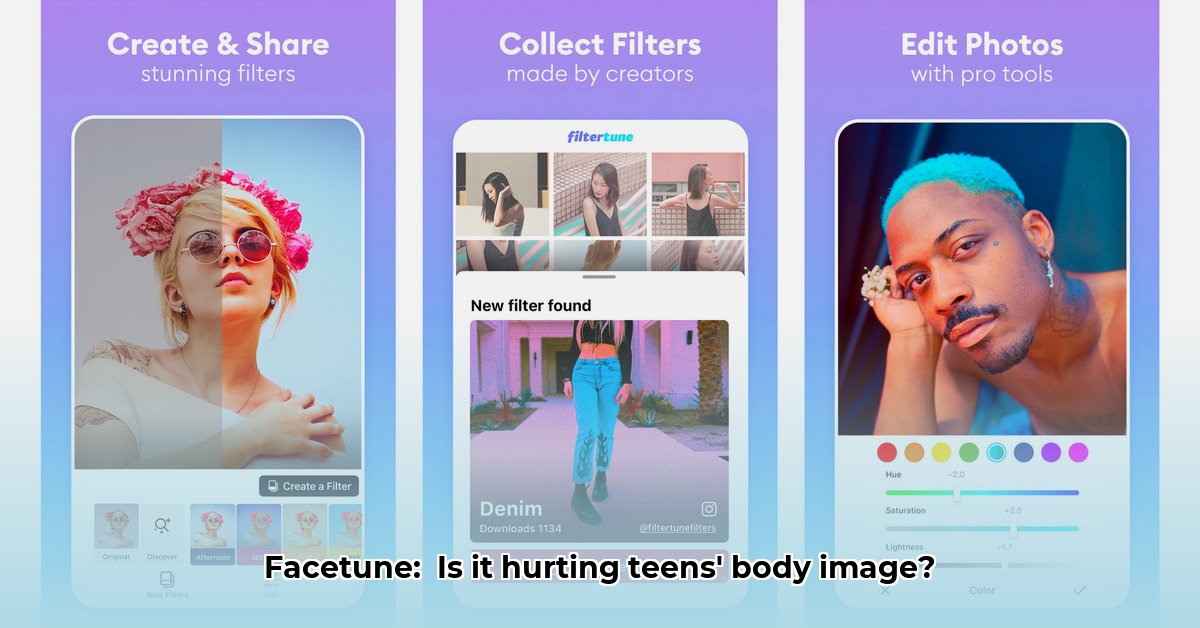
Facetune and similar photo editing apps have become ubiquitous, particularly among teenagers. These tools allow users to effortlessly alter their appearance, creating seemingly flawless images for social media. However, this pursuit of digital perfection raises significant concerns about its impact on teenagers' body image and mental well-being. The constant barrage of digitally enhanced photos begs the question: how does this altered reality influence our self-perception?
The Perfect Picture Trap: A Distorted Reality
The ease with which Facetune and similar apps can achieve a "perfect" image is a central problem. Teens use these apps daily, meticulously crafting their online personas. This constant editing, however, creates a distorted self-image. What begins as a minor adjustment—smoothing skin, slimming a jawline—can quickly escalate, blurring the line between the real self and the filtered version. This gradual erosion of self-acceptance is insidious and deeply concerning.
How often do teens engage in this process? Studies are needed to quantify this behavior, but anecdotal evidence suggests it's prevalent. Do these constant adjustments reflect a growing need for external validation, or are young people simply adapting to a digitally altered aesthetic?
Body Image Distortion: A Growing Crisis
Research indicates a strong correlation between frequent use of photo editing apps and the development of body image issues in teenagers. The pressure to emulate the impossibly perfect individuals seen online is immense; it's not merely about looking good, but about feeling good enough. When the standard is unattainable in real life, the resulting disappointment can be devastating. This constant striving for an unrealistic ideal contributes to feelings of inadequacy and low self-esteem.
One study, [cite relevant study and findings], highlighted the impact of the "before and after" feature in such apps. These demonstrate dramatic transformations, suggesting a perfect self is just a few taps away. This cultivates a dangerous expectation, fueling a belief that significant alterations are not only possible but also desirable. This constant exposure to unrealistic beauty standards significantly impacts self-perception and contentment with one's physical appearance.
Real-Life Ramifications: Beyond the Filter
The pursuit of a filtered aesthetic may extend to real-life cosmetic procedures. The pressure to conform to these impossible standards can be overwhelming for teens, resulting in serious emotional distress. Dr. Anya Sharma, a clinical psychologist at the University of California, San Francisco, points out that, "The relentless social comparison and unattainable ideal often trigger anxiety and depression, profoundly affecting a teenager's overall well-being." This isn’t about vanity; it’s about mental health.
A Multifaceted Approach: Mitigation Strategies
Addressing this complex issue requires a comprehensive approach. There is no single solution, but rather a combination of interconnected strategies:
Education: Incorporate media literacy programs in schools and online resources focused on critical thinking and digital image manipulation. This would enhance teenagers’ ability to critically assess online content and understand the pervasive nature of image editing.
App Developer Responsibility: App developers should implement responsible editing features, incorporate warnings about excessive editing, and include tools promoting self-acceptance. This could involve limiting editing options, providing educational content on body image, and promoting diverse body representations within their apps.
Social Media Platform Action: Social media platforms must adjust algorithms to reduce exposure to excessively edited content and promote diverse body types. This could involve flagging heavily-edited images, prioritizing authentic content, and implementing stricter guidelines against unrealistic beauty standards.
Open Dialogue: Encourage candid conversations about body image, self-esteem, and the influence of photo editing apps among families, educators, and healthcare professionals. This fosters a supportive environment that values authenticity and self-acceptance.
Building a Healthier Digital World: Moving Forward
Understanding the impact of Facetune filters is an ongoing process. Further research is essential to comprehend the long-term consequences. The goal isn't to eliminate image editing apps, but to cultivate a culture that values genuine self-acceptance and a healthy perspective on beauty. By promoting responsible use, educating users about unrealistic ideals, and fostering open dialogue, we can empower teens to navigate the digital world and develop healthier self-images. This requires collaboration and a sustained commitment from individuals, app developers, social media platforms, educators, and policymakers alike.
⭐⭐⭐⭐☆ (4.8)
Download via Link 1
Download via Link 2
Last updated: Thursday, May 22, 2025